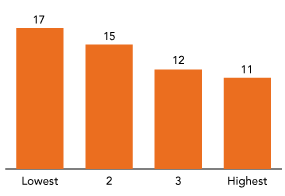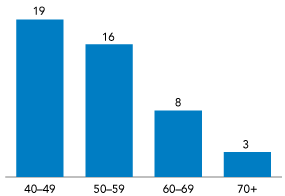
The Impact of the Recession on Older Americans
(March 2010) The current recession, the worst financial crisis since the Great Depression, has contributed to a decline in consumer wealth, reduced incomes, record unemployment, and increased poverty. Broad national surveys such as the Current Population Survey (CPS) and American Community Survey (ACS) have captured these shifts in the U.S. population’s economic circumstances. However, such surveys do not distinguish the effects of the financial crisis leading up to the recession from other broad trends that might occur simultaneously or that actually started before the crisis. With support from the National Institute on Aging and the Social Security Administration, the American Life Panel (ALP) and the Health and Retirement Study (HRS) have collected data that chronicle the effects of the recession on American households and older individuals.1
American Households in Distress
Figure 1
Households Affected by Financial Distress by Income Quartiles (Percent)

Source: Analyses of American Life Panel Survey, Michael Hurd and Susann Rohwedder, RAND Corporation.
Although the National Bureau of Economic Research (NBER) could declare that the current recession will end by the close of 2010, the impact on American families will continue through 2011 and may have long-lasting consequences for many. Mounting evidence indicates that the recession has erased decades of improvements in material well-being for the most vulnerable groups—children, the elderly, and the poor.
By enhancing data collection conducted as part of the ALP, researchers implemented a series of surveys in which they asked households about their financial circumstances, spending behavior, retirement plans, and other conditions that could have been affected by the recent financial crisis and the recession. Analyses done by Michael Hurd and Susann Rohwedder of the RAND Corporation show that the economic crisis had profound effects on the majority of American households. Reports by individuals (in January 2010) ages 40 and older showed that a little over 70 percent of them and their households felt they had been affected “a little” or “a lot” by the events related to the economic crisis. In order to identify households suffering immediate financial distress the researchers studied the fraction of households who experienced at least one of the following: being more than two months behind with mortgage payments, negative home equity, foreclosure, or the respondent and/or spouse being unemployed. Between 10 percent and 15 percent of householders over age 40 were affected in this way at any one time between November 2008 and January 2010. However, these are not always the same households. Looking back from January 2010, about 30 percent of householders had experienced immediate financial distress defined in this way at some time since November 2008. The effect of the financial crisis varied across socioeconomic and demographic groups. Low-income householders and younger householders experienced financial distress more often than wealthier and older ones (see Figures 1 and 2). In addition, younger householders (40-to-64-years-old) reported negative home equity (9 percent) more often than older householders did (4 percent).
Decrease in Household Spending
In response to financial distress and economic uncertainty, American households decreased their spending. In November 2008, 73 percent of households reported having reduced spending in response to the economic crisis. Households in which the household head or spouse lost a job experienced the greatest declines in total spending. About one-quarter of all households reduced health-related spending in the six months prior to the November 2008 survey, and this trend continued in subsequent months.
The decline in spending seemed to have halted in November 2009. However, reduced spending among the general population and diminishing savings among households affected by job loss may last for a long time. Forgoing preventive check-ups and medical treatments for chronic conditions might lead to immediate health deterioration and to higher health care costs in the long run. Families that reduce their health care spending are more likely to put off regular check-ups for children and dental treatment, or they may even limit health care to catastrophic events.2
Financial distress also increased the probability of delayed retirement, another way to ease losses in retirement savings.3 Analysis of HRS data from 2008 and 2009 by David Weir of the University of Michigan suggests that an increasing proportion of older Americans may delay retirement. Results from the 2009 HRS Internet Survey indicate that about 65 percent of workers ages 50 to 61 expect to be working full-time when they reach age 62 and that over 55 percent of workers ages 50 to 64 expect to be working full-time when they reach age 65. These numbers represented an increase over those reported in 2008. The Bureau of Labor Statistics had reported rising labor force participation for both men and women ages 65 and older. The findings from HRS, however, suggest the financial crisis and the recession is likely to accelerate this increase in labor force participation among older individuals.
Coping With Unemployment
Figure 2
Households Affected by Financial Distress by Age Groups (Percent)

Source: Analyses of American Life Panel Survey, Michael Hurd and Susann Rohwedder, RAND Corporation.
For households experiencing unemployment, the biggest adjustment mechanism was spending. Among households experiencing unemployment, 89 percent reduced spending and 50 percent reduced saving, while 27 percent reported they were behind on bills. To supplement their income, 39 percent relied on unemployment benefits and 35 percent used their savings, while 28 percent relied on family and 22 percent relied on friends for financial help and credit-card borrowing.
The current recession marked unprecedented changes in the lives of older Americans. According to a report by Richard Johnson of the Urban Institute, the number of unemployed people ages 55 and older more than doubled from November 2007 to August 2009, a historic high for this age group.4 Rising unemployment for older adults is due mainly to the rise in labor force participation for that group. This in turn may be attributed to concern about inadequate retirement benefits and a decline in defined benefit pension plans.
Consequences of unemployment can be much more severe for older workers. Previous research shows strong evidence that older workers have more difficulty getting reemployed.5 Older unemployed persons also face difficulties meeting spending needs as they lose income and health insurance. This culminates in a loss of savings, benefits, and pension plans, all of which are crucial for retirement.
More Optimism in Short Term
Consumer confidence is important in measuring attitudes about current and future economic conditions. It determines spending, which in turns drives economic growth and can affect unemployment (consumer spending makes up a large proportion of GDP). According to the ALP, in February 2009, 26 percent of 40-to-64-year-olds anticipated a decline in spending. By January 2010, only 13 percent expected a reduction in spending, showing an increase in optimism. Respondents, on average, also became more optimistic about near-term prospects in the stock market. However, they became less sure that there would be stock market gains over the long term. They also predicted no improvement in employment or housing prices in the near future.
The effects of the current recession extend beyond unemployment rates and low GDP. The crisis has touched many families of all ages and income levels. Younger and poorer households have been more adversely affected than any others. Falling housing prices and high unemployment rates have led to reduced spending, even for those not affected by the economic situation. Consumer confidence declined sharply in February 2010 after a slight increase in January 2010; this decline might lead to a change in household spending behavior.6
The ALP and the HRS were quick to respond to the sudden turn of events, and have provided timely and accurate data on the current financial and economic crisis and its impact on American households. Given what we know through the ALP and HRS surveys, it is crucial to continue tracking the recession’s impact on American households. Such data will give policymakers the information needed to formulate more timely evidence-based responses to economic hardship. In addition, these data may also assist in the evaluation of strategies for alleviating long-term economic insecurities felt by many American families.
Nadwa Mossaad is research associate, Domestic Programs, at the Population Reference Bureau.
References
- The ALP—a national longitudinal survey of persons of ages 18 and older maintained by the RAND Corporation—has asked a series of questions relevant to the economic crisis at regular intervals since November 2008. The ALP is Internet-based, with monthly samples of about 2,500 respondents. The economic crisis questions probed the effects of the financial crisis on American households, particularly employment status, retirement, change in housing, delinquencies in bill payment, spending history, and future economic expectations. HRS has been collecting biennial data on persons 51 and older since 1992. The HRS 2008 interviews were collected before the financial crisis, while subsequent Internet and mail surveys collected in collaboration with RAND captured the impact of the recession on the older population after the recession.
- Kaiser Commission on Medicaid and the Uninsured, Turning to Medicaid and SCHIP in an Economic Recession: Conversations With Recent Applicants and Enrollees (Washington, DC: Kaiser Commission on Medicaid and the Uninsured, 2008), accessed at www.kff.org/medicaid/upload/7847.pdf, on March 1, 2010.
- Richard W. Johnson, Mauricio Soto, and Sheila R. Zedlewski, How Is the Economic Turmoil Affecting Older Americans? (Washington, DC: The Urban Institute, 2008).
- Richard W. Johnson, Rising Senior Unemployment and the Need to Work at Older Ages (Washington, DC: The Urban Institute, 2009).
- Center for Retirement Research, Boston College, “Do Older Workers Face Discrimination?” accessed online at http://thecenekreport.squarespace.com, on March 5, 2010.
- As measured by the Consumer Confidence Survey.
